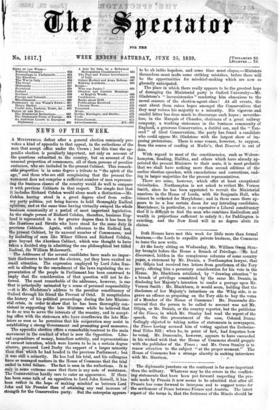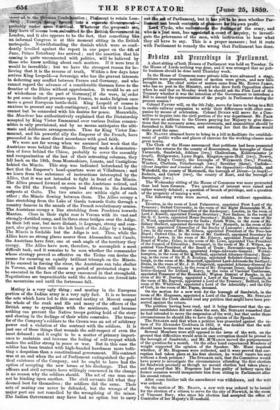to the German Confe()nation ; Piedmont to retain Lom- hatt'y
; Venet,31; *sing *met into a separate Croverumeirt- probably under some -Cardinal. Whatever the proposals are, they have of course been.imbniitted to the British Government in London, and it also appears to be the fact, that something like an informal Congress is at this moment sitting in the British metropolis. Notwithstanding the denials which were so confi- dently levelled against the report in our paper on the 4th of tune, Prince Esterhazy has arrived ; and the assertion that his coming is quite unconnected with politics, will be believed by those who know nothing about such matters. If it were true it would be incredible ; but we have the strongest reason for be- lieving that it is the reverse of .truth, Within a few days later arrives King Leopold—a Sovereign who has the gravest interests in deferring any conflict between France and Germany, and who cannot regard the advance of a considerable German force to the frontier of the Rhine without apprehension. It would be an act of wickedness on the part of Germany] if she were, in: order to put some indirect pressure upon France, to make Belgium once more a great European battle-field. King Leopold of course is anxious to present any such contingency, and his visit to London cannot but be connected with his desires for peace. Meanwhile, the Mon iteur has authoritatively explained that the Dictatorship accepted by King Victor Emmanuel over various Italian commu- nities is only provisional, and by no means anticipates the ulti- mate and deliberate arrangements. Thus far King Victor Em- manuel, and his powerful ally the Emperor of the French, have proceeded in the most direct accordance with good faith. We were not far wrong when we assumed last week that the Austrians were behind the Minch). Having made a demonstra- tion of force behind the Chiese, probably to cover the assembly and reorganization of the last of their retreating columns, they fell back on the 19th, from 3fonteehiaro, Lonato, and Castiglione behind the Mineio. This step was indicated beforehand by the fact that the Emperor's head-quarters were at Villafranea ; and we learn from the substance of instructions intercepted by the Allies, that it was not intended to fight in front of the Mineio. The Allies pressed forward as soon as the Austrians retired, and on the 234 the French outposts had driven in the Austrian outposts at Ooito. The two armies are within sight of each other ; the Mind) flowing between them. The Allies occupy a line stretching from the Lake of Garda towards Goito through a country famous in the annals of the French revolutionary armies. The Austrians occupy a line stretching from Peschiera towards Mantua. Close in their right rear is Verona with its vast and strongly-fortified camp, and its three stone bridges over the Adige. In their left rear, but more distant, is Legnago, strong and com- pact, also giving access to the left bank of the Adige by a bridge. The Mincio is fordable but the Adige is not. Thus, while the Allies have no strong places nearer than Alessandria. and Casale, the Austrians have four, one at each angle of the territory they occupy. The Allies have now, therefore, to accomplish a most difficult task, and it remains to be seen whether the commander whose strategy proved so effective on the Ticino can devise the means for ensuring an equally brilliant triumph on the Mineio. If he succeed in forcing the river, the Austrians can take shelter in Verona, and then will ensue a period of protracted sieges to be executed in the face of the army ensconced in that stronghold. Negotiations are impracticable until the Austrians are forced into the mountains and until the fortresses fall.

























